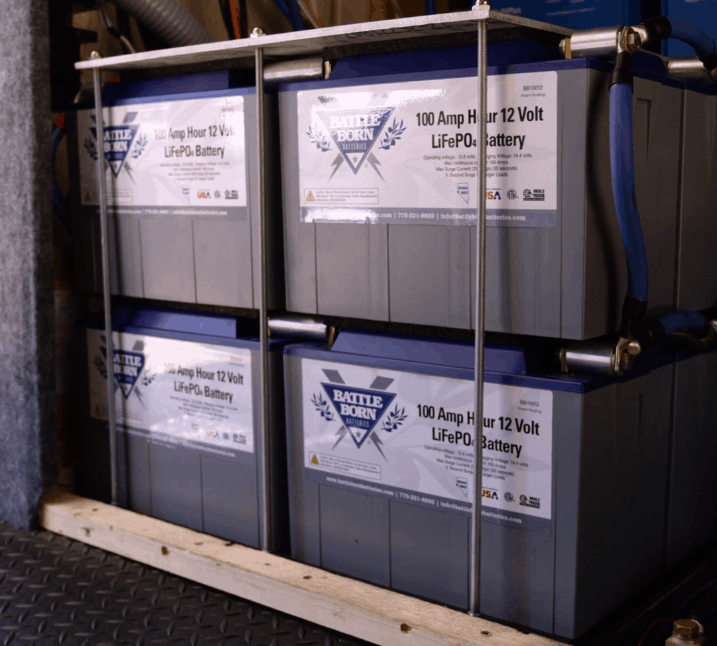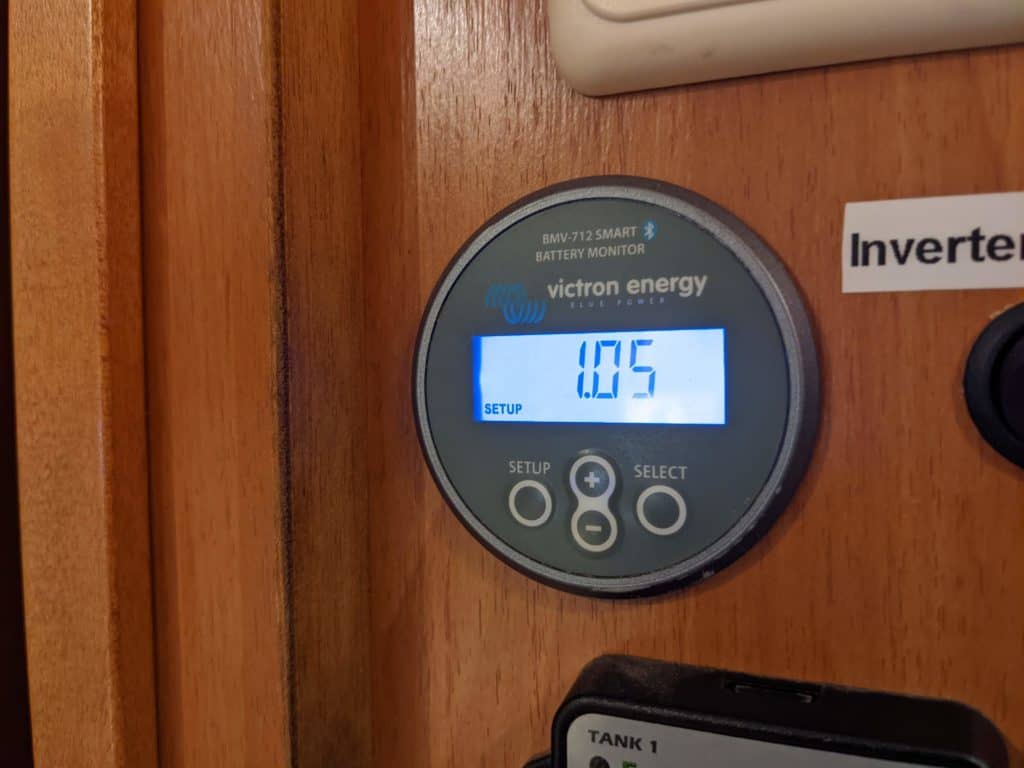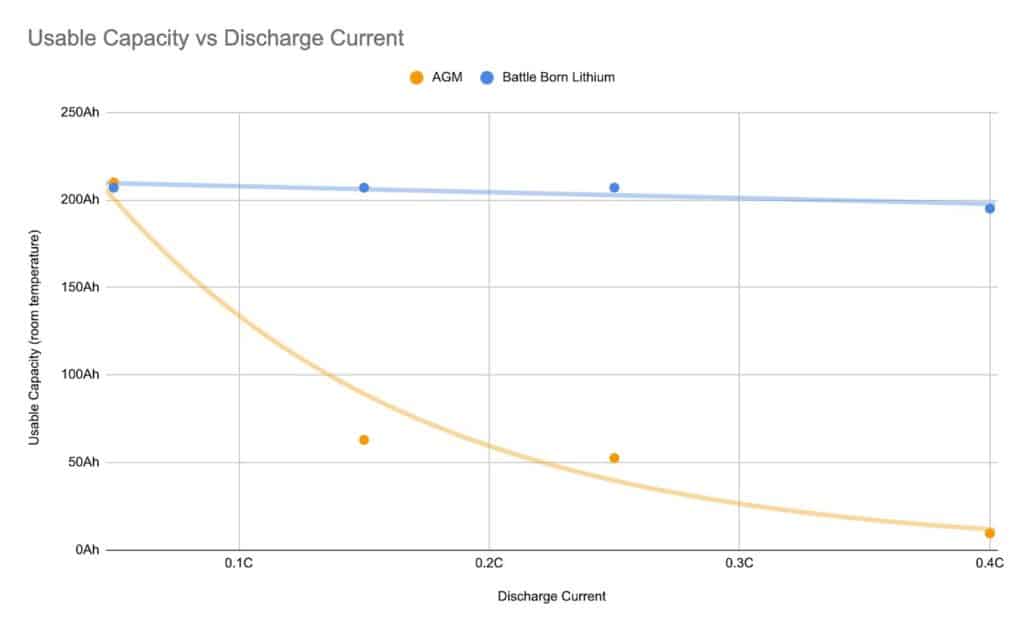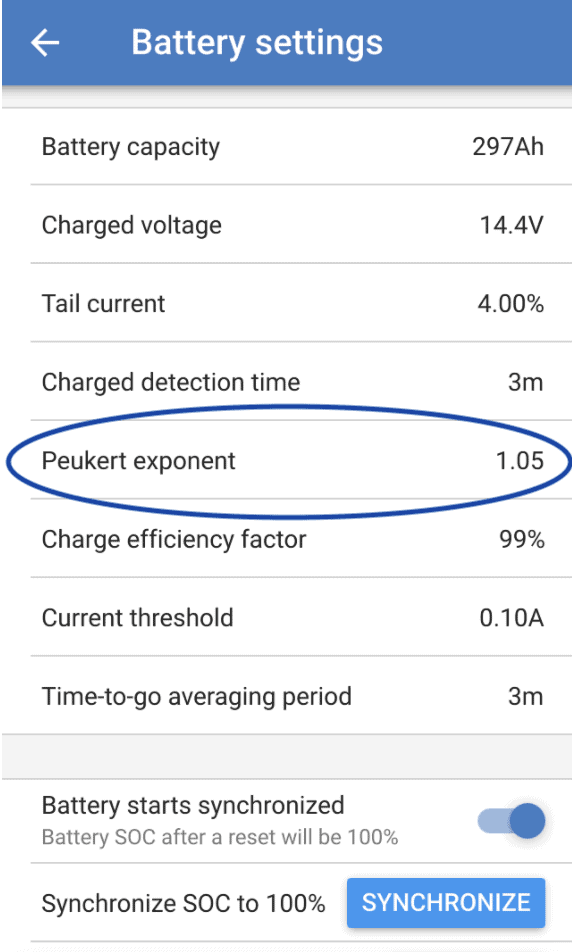
MENUMENU
TALK TO AN EXPERT
Special Hours: 7AM – 6PM PST
TALK TO AN EXPERT
Special Hours: 7AM – 6PM PST
Have you ever wondered why your batteries don’t last quite as long as you hoped when using large loads? If you have lead-acid batteries, it’s common for them to only put out a percentage of the energy they’re storing in this scenario. Part of the reason for this is something called the Peukert effect, and it can help us understand how much power we’ll actually get from a battery.
Interested in learning how the Peukert effect works? Keep reading to learn about what it is, how it’s calculated, and which type of battery is least affected by this energy-draining phenomenon.
Peukert’s law is tricky. It basically throws a wrench into everything you know about a battery’s amp-hour (AH) rating and, ultimately, how long your battery will last. After all, a 100AH battery should last either 100 hrs at 1 amp, 20 hrs at 5 amps, or 1 hr at 100 amps, right?
Not quite–and this is where the Peukert Effect comes into play. It mathematically explains how the rate of discharge influences the battery’s actual capacity. If you run your battery at a high rate of discharge, the internal resistance within the battery creates a voltage sag that ultimately shortens how long it will last.
This is the Peukert effect in a nutshell.
So, how do you find out how long your batteries will truly last? With this formula:
t = H(C/IH)k
In this formula, t is the actual time it takes to drain the battery, I is the actual discharge current (in amps), H is the battery’s rated discharge time (in hours), C is the battery’s rated capacity (in amp hours), and k is the Peukert constant.
We can then rearrange the formula to find the real amp hours, given the actual discharge time, the rated discharge time, the battery’s rated capacity, and how many amps your battery emits.
It = C (C/IH)k-1
For example, if you have a battery rated at 100AH at a 20 hr rate that runs for 4.79 hours at 15 amps, you’ll find that your actual AH rating is 71.9AH instead of 100AH.

Okay, but what is the Peukert exponent? After all, you’ll need this to find your battery’s actual amp hour rating. Understanding the exponent is important because it indicates how quickly the battery’s capacity will diminish with the discharge rate. A higher exponent equals a faster rate of depletion.
The Peukert exponent, or k, will differ for each battery, but its value ranges between 1 – 1.6. The formula to determine the Peukert exponent is a little more complex–it looks like this:
k = (logt2 – logt1) / (logI1 – logI2)
If you get the correct answer to this equation, remember that it’s still an approximation. Various conditions like high currents and the amp draw can alter the answer. But it’s still helpful in predicting your battery’s capacity discharge rate.
Most of the time the correct Peukert exponent is provided by the battery manufacturer. This exponent is needed for accurately setting battery meters.

Unfortunately for owners of lead-acid batteries, Peukert’s law has a much greater effect on them than it does on lithium-ion batteries. This is due primarily to lead-acid batteries’ chemistry.
Under high loads, the internal resistance of the batteries uses up even more energy from the chemical reaction faster than at low loads. This is why the batteries appear to provide less energy under large loads.

Compared to lead-acid batteries, lithium-ion batteries hardly even experience the Peukert effect. For example, most lithium-ion batteries are 95 – 98 percent efficient. This means they can discharge 98 percent of their stored energy.
In contrast, lead-acid batteries only contain about 80-85 percent of usable energy. This is because lithium-ion batteries have a much higher energy density and a much lower internal resistance.

Unfortunately, the amp hour rating of your batteries isn’t entirely accurate or always repeatedly attainable. There are lots of factors that will affect the battery’s performance. For lead-acid, the Peukert effect is one of the largest.
The Peukert effect explains why a battery loses efficiency when you run it at a high rate of discharge, and you can use its formula to determine the actual amp-hours of your batteries. Because of this, the Peukert exponent is used in battery monitors to help get a more accurate usage statistic.

Fortunately, lithium-ion batteries provide an efficient alternative to lead-acid batteries of the past. They’re less affected by Peukert’s Law, and you can use almost all of the energy they store. You can feel more confident powering your vehicles or devices and get more amperage per battery!
Do you have any questions about the Peukert Effect? Leave them in the comments below!
We know that building or upgrading an electrical system can be overwhelming, so we’re here to help. Our Reno, Nevada-based sales and customer service team is standing by at (855) 292-2831 to take your questions!
Also, join us on Facebook, Instagram, and YouTube to learn more about how lithium battery systems can power your lifestyle, see how others have built their systems, and gain the confidence to get out there and stay out there.
Shop Best Sellers








Ask a technical specialist now at 855.292.2831
Stay in the Know